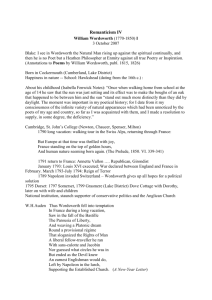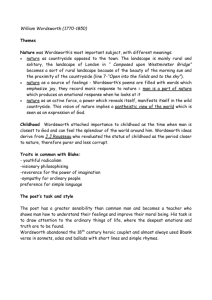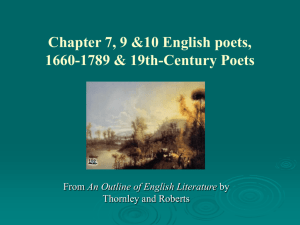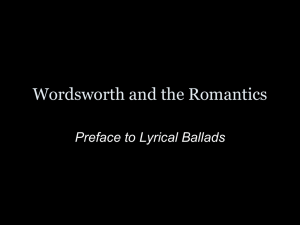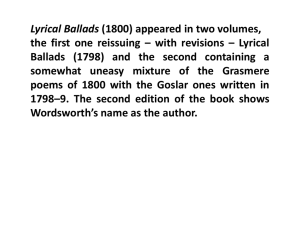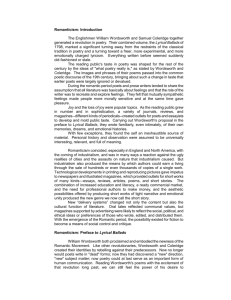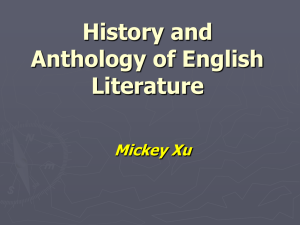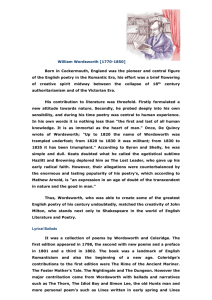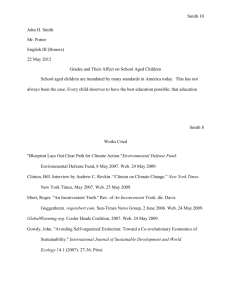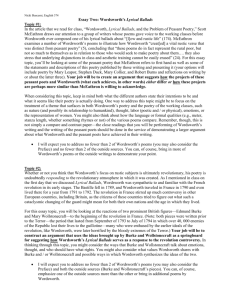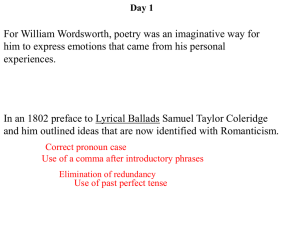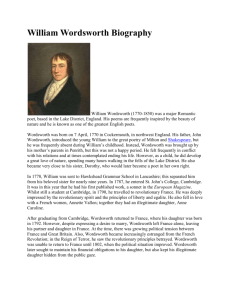Document
advertisement
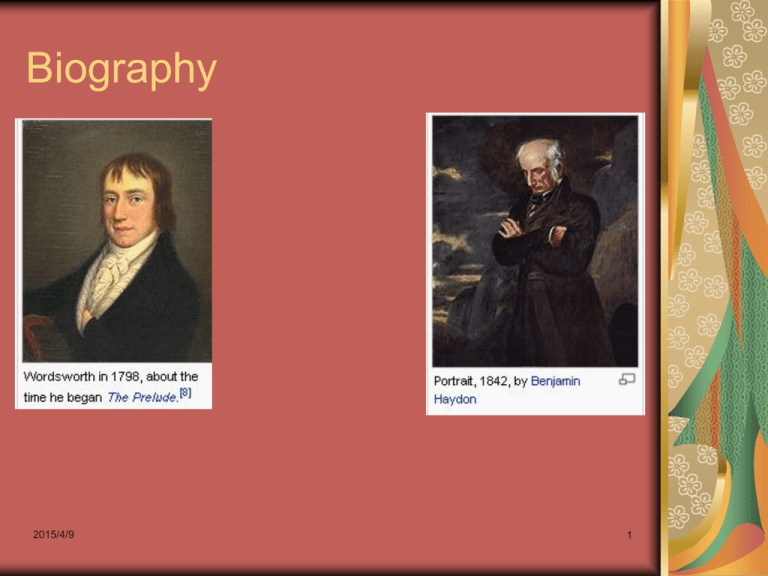
Biography 2015/4/9 1 Biography born in Cockermouth, Cumberland, in the Lake District of northwestern England on April 7, 1770 orphaned at an early age entered St. James College, Cambridge In 1787 received a degree without honors in 1791 2015/4/9 2 Biography In 1795, Wordsworth settled with his sister Dorothy in a cottage at Racedown, Dorset. In 1798 , Lyrical Ballads was published. In 1813, he was appointed stampdistributor for Westmoreland . In 1843, he became Poet Laureate of England. died in 1850 at the age of eighty 2015/4/9 3 Two periods of his poetic career Early period (more successful) 1. He wrote most of his great poetry 2. His politics were liberal, his religion ambiguous . 3. He had displayed no interest in the church, and his poetry seemed almost pagan in tone Second period (decline) 1. 2. 3. 4. 5. 2015/4/9 In 1793 he had been a revolutionist. By 1798 his attitude toward France with Napoleon in power began to change . By 1802, his political opposition to Napoleon was explicit . By 1813, when he became stamp-distributor, he was clearly conservative. He became a pillar of the Anglican Church 4 The Lake District 2015/4/9 5 2015/4/9 6 His Philosophy His philosophy of nature His division of a man’s whole life 2015/4/9 7 His philosophy of nature He believed that it was through the permanent forms of nature that God was revealed to man. What Wordsworth meant in his philosophy of nature is not that God is nature, but that nature is a manifestation of God's creation in its purest, most uncorrupted form. It is through nature that man communicates with God, learns about God, and enjoys the holy and awesome feelings which are religious feelings. In this sense, “nature” is a metaphor for God in Wordsworth's poetry, not a synonym. 2015/4/9 8 His philosophy of nature His best poetry is the lofty and sublime expression of the divine solace and comfort which he found in nature. He believed that the soul, instructed by the senses and by nature, transcends both and becomes assimilated with a divine totality. 2015/4/9 9 His division of a man’s whole life Childhood Youth Maturity 2015/4/9 10 Childhood The awareness of the child is totally sensuous and unselfconscious. But his experience of the world is more spiritual than he knows, more unified, and more joyful because his senses respond to experience in a pure and innocent way. 2015/4/9 11 The image of the child The child is an important figure in Wordsworth's philosophy and his poetry. He believed in immortality, in the idea that the soul lives forever. This means that the pure soul exists before birth as well as after death. During life, the secrets of the soul are hidden to humans. But the child, because he has lived for so short a time, is still close to the state of preexistence. His birth into human form has erased from his conscious memory the pre-life of his soul, but there is still an unimpaired subconscious memory of eternal bliss, which allows the child, through his human senses, to respond to nature and the world with instinctive joy and with the innocence of a pure soul. The child, then, Wordsworth believed, has a special kind of wisdom to which men can turn for instruction. In addition, because childhood perceptions are remembered in youth and later maturity, the mature man can use this memory to learn of the continuity of his own existence. He can acquire a sense of wholeness within himself and a sense of identification with God. 2015/4/9 12 Youth As the child matures into youth, he becomes more selfconscious. The joy is tempered by a sense of loss, and his perception is no longer unified, but disturbingly dualized. The youth sees and remembers the things that have once produced his sense of joy. He still finds pleasure in experience, but he is conscious of the missing element of joy, and begins to ask why. 2015/4/9 13 Maturity As the youth matures, he develops wisdom. He learns in his maturity to understand the triple stages of man's life and, through the wisdom achieved in maturity, he experiences a new kind of happiness. It is not the unconscious joy of the child, or the pleasure of awareness which the young man feels, but the contentment of wisdom of the older man. It is in the final stage of life that man can re-identify with nature, not with his senses alone as the child knew it, not with the conscious pleasure of the youth, but with his soul as only the mature man can understand it. Wordsworth's later poetry reflects the contentment and mature wisdom of his philosophy. It no longer expresses the conflict and perplexities of a youthful searcher. Because the passion for life and the conflict which the earlier poetry reflects often do not appear in the later works, critics have often judged the “quietism” Wordsworth achieved in his later years as a mark of “decline.” 2015/4/9 14 His Works Lyrical Ballads Some famous poems I Wandered Lonely as a Cloud The Solitary Reaper 2015/4/9 15 Lyrical Ballads The publication in 1798 of this book marked the “official” opening of the English Romantic period. The authors: Wordsworth and Coleridge The book opened with Coleridge's justly famous “The Rime of the Ancient Mariner” and closed with Wordsworth's now recognized masterpiece “Lines Composed a Few Miles above Tintern Abbey” ( “Tintern Abbey” ). 2015/4/9 16 Lyrical Ballads • • • 2015/4/9 In 1800 Wordsworth prepared a second edition, to which he added a second volume of his poems. Wordsworth's Preface was a “defense of the theory upon which the poems were written.” In the Preface Wordsworth makes clear the following points : Good poetry must speak language “really spoken by men” and write about the life of common people in an imaginative way. Good poetry is “the spontaneous overflow of powerful feelings.” The objects which excited these emotions were to be ordinary ones: a tree, a mountain, an old man and so on. 17 Lyrical Ballads • • 2015/4/9 The style selected for the new poetry was also to be simple. He avoided the “Personifications of abstract ideas” and the “poetic diction,” in order to imitate the “the very language of men”. A poet should give pleasure and reveal universal truth. Wordsworth believes a poet is “a man speaking to man,” but he is a more feeling and more sensitive man, one “who rejoices more than other men in the spirit of life that is in him.” Wordsworth affirms the Aristotelian classification of poetry as “the most philosophic of all writing” whose object is not a specific truth but a “general and operative” truth, and he argues that the poet is free in all respects but one. He must give pleasure. In accepting this requirement, the poet indirectly acknowledges “the beauty of the universe.” He pays homage “to the native and naked dignity of man” when he agrees to provide the pleasure through which man acquires knowledge. Thus, in Wordsworth's opinion, the poet “binds together by passion and knowledge the vast empire of human society, as it is spread over the whole earth, and over all time.” 18 Some famous poems We Are Seven” “Her Eyes Are Wild” “Simon Lee” “Lines Written in Early Spring” “To My Sister” “Expostulation and Reply” “Tintern Abbey” The “Lucy Poems” “Michael” 2015/4/9 “My Heart Leaps Up” “Resolution and Independence” “Westminister Bridge” “It Is a Beauteous Evening” “London, 1802” “The Solitary Reaper” “I Wandered Lonely as a Cloud” “Ode to Duty” “Ode: Intimations of Immortality” “To a Skylark” 19
